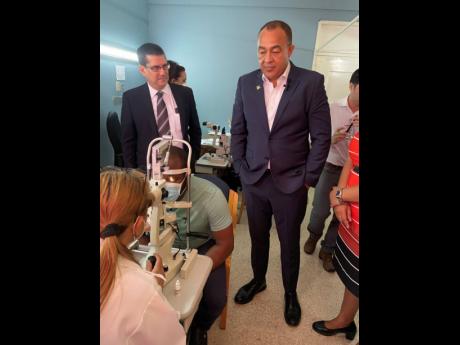Specialist shortage!
Health minister happy with Jamaica/Cuba Eye Care Programme, wants more collaboration to satisfy demand
Health and Wellness Minister Dr Christopher Tufton is bemoaning the current shortage of optometrists and ophthalmologists in Jamaica and says time has come to engage in a conversation on solutions to satisfy the demands of the population.
Dr Tufton was speaking Tuesday following a tour of the Jamaica/Cuba Eye Care Programme facility at the St Joseph’s Hospital in Kingston.
“We need to look at how we satisfy the gaps in our market for health care professionals by rethinking the approach to how these professionals are qualified to practise in this market. And what are the barriers that may be an obstruction ... because you want to maintain standards, having greater access to other similar professionals to come in and treat with the demands that exist,” Tufton said.
“There is an exam that is taken to get those who are trained overseas to come into the market place. The same could be said for doctors and nurses and so on… how (do) we make it hassle free for other professionals in the field where there is a shortage, who may be trained elsewhere to access this market to support the populations need,” Minister Tufton said.
He said there should be free movement of professionals between countries and markets, without any major restriction.
“For an ophthalmologist to leave Trinidad to come to Jamaica, they have to sit an exam even though they were trained at the same University of the West Indies – just the Trinidad campus. I think that is wrong. The truth is, it is one institution and if they are qualified, the standards are similar,” Tufton said.
“But indeed, I will go further. I believe that if we were to identify institutions within the Commonwealth or otherwise, once certain standards are met, we need to make it easier for professionals to move.”
The health minister said that for nurses and doctors who are being recruited by Europe and North America, many of the former requirements like entry exams, residency status and settling allowances have been waived or reduced significantly to accommodate freer movement as those populations moved to satisfy the demands in those markets.
Tufton says talks have already begun on making a broad policy statement for deeper conversations on the matter which will involve himself as minister, and all the professional associations.
“(Discussions) around how we accommodate by recognising the gaps, free flow to satisfy the population, otherwise we gonna run into shortages that are going to be very difficult to deal with. We are happy for this programme. This is filling an important gap but we gonna have to do more to deal with this and other areas,” he said.
CONTINUED SUPPORT
The minister applauded the collaboration with Jamaica’s Spanish-speaking neighbours and said the programme is doing very well. He expressed hope that the mutually benefiting partnership which started before he took office, would continue.
“On average I’m told over 100 persons are seen a day for different reasons. An approximate 20 surgeries are done per day. Now, think of that from September and it tells you how much surgeries are being done… it’s probably one of the first times I have seen a hospital setting where people are so happy because of the service. They have commented very positively,” Tufton said.
He believes collaboration is necessary and that Jamaica has a reputation of training excellent healthcare workers.
“The reality of the global situation is that (re)healthcare workers, there is a major shortage and Jamaicans who are trained in a number of areas including optometry and ophthalmology, many of them provide services to other populations elsewhere in the world, just as our doctors and our nurses,” he said.
Dr Tufton said COVID-19 has taught that if the world does not come to terms with the need for collaborations, then we are all going to be vulnerable.
Cuban Ambassador to Jamaica, His Excellency Fermîn Gabriel Quiñones Sanchéz, stressed the importance of the swift resumption of the Cuba eye care programme after the COVID-19 pandemic, and pledged the country’s continued support..
“Seventeen Cuban doctors and technicians are working to help the Jamaican people, and will continue cooperating all the time ... to continue with the programme. It is happy to know that the patients are happy because a big problem is coming to a solution and that’s why doctors are here working with the Jamaican population. I think in a year thousands of Jamaicans would be receiving surgeries and the problem that they have with the eye will be solved very soon. That’s the most important message,” he said.
The Jamaica/Cuba eye care initiative began in 2010 and was initially to run for three years after which it was projected that enough Jamaican medical personnel would have been trained to take over the operation of the centre.
STATISTICS TABLE: Jamaica /Cuba Eye Care Programme (since September 2023):
Consultations (pre and post operations) 5,847
Cataract surgeries 368
Pterygium Patient surgery 160
Diabetic retinopathy (laser treatment) 702
Postponed surgeries 200 (because of chronic illness)

